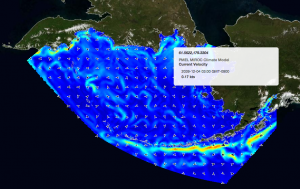
Click to enlarge
This screenshot shows projected current velocity produced by a NOAA's Pacific Marine Environmental Laboratory model. The vulnerability assessment uses models such as this one to help frame their analyses. All the models and projections can be accessed through the AOOS Ocean Data Explorer.
A team of researchers examining how climate change might affect the resources of the Aleutian and Bering Sea Islands will share findings and open a dialogue with residents of Unalaska on September 18 and St. Paul on October 9. Over the past six months, teams of experts with knowledge about key resources and ecosystem services (such as seabirds, fisheries and subsistence culture) have volunteered their time to draft short chapters for the Aleutian and Bering Climate Vulnerability Assessment (ABCVA) detailing specific vulnerabilities to climate change based on model projections.
Climate models use quantitative methods to simulate the interactions of the atmosphere, oceans, land surface, and ice and estimate future changes to variables such as temperature, precipitation, salinity and wind. In Unalaska and St. Paul, project partners hope to learn what local residents are observing, what future climate patterns may emerge, and potential impacts on communities and the natural resources they depend upon. Learn more.
Aleutian Island and Bering Sea residents interested in sharing observations but unable to attend the community meetings may arrange a brief one-on-one interview by contacting Ellen Tyler at Tyler@aoos.org.
This project is a collaboration between the Aleutian and Bering Sea Islands LCC (ABSI LCC), the Alaska Climate Science Center (AK CSC) and the Alaska Ocean Observing System (AOOS). The leadership team includes: Jeremy Littell (AK CSC), Aaron Poe (ABSI LCC), Ellen Tyler (AOOS), and Tom Van Pelt (AOOS).
